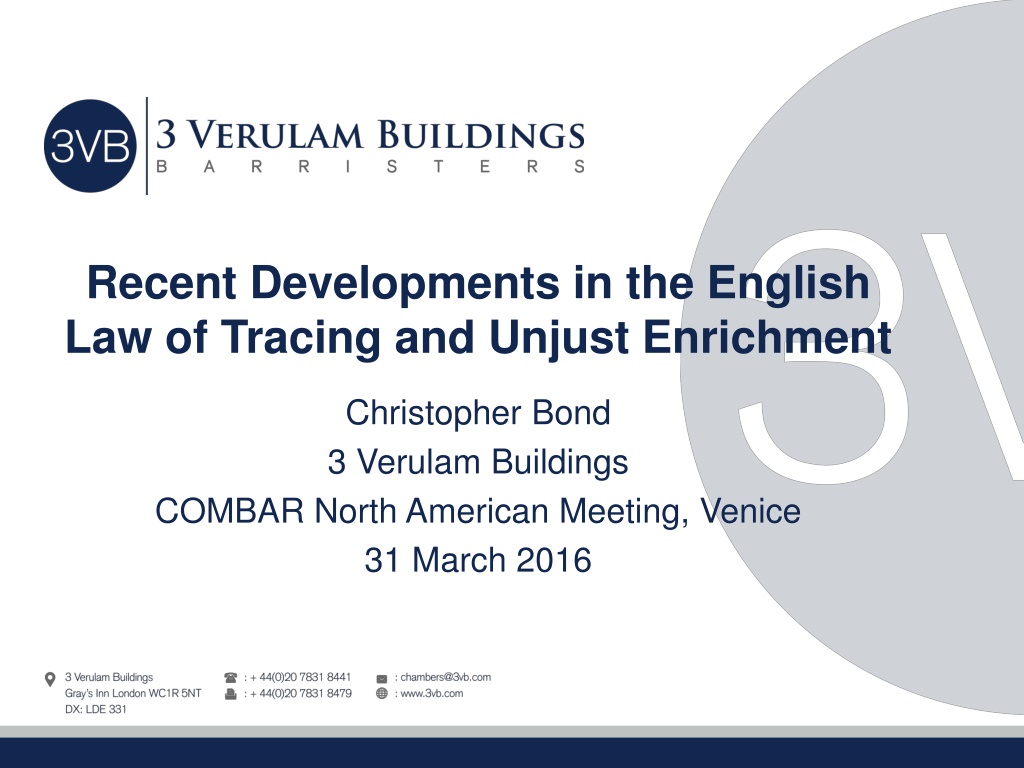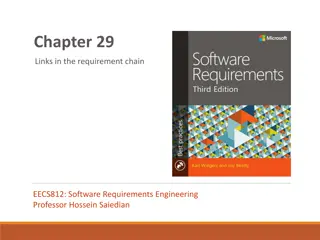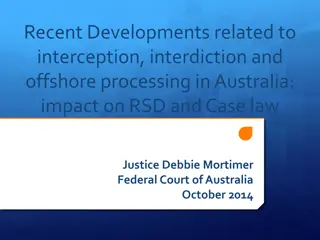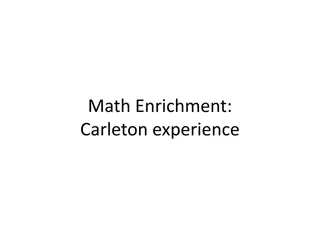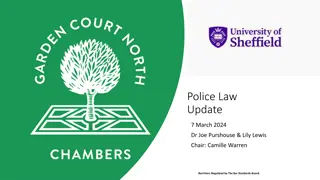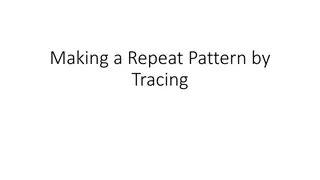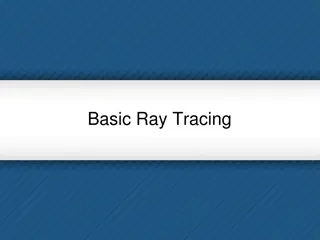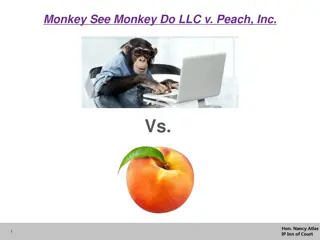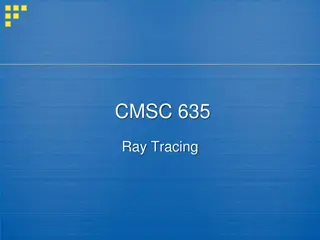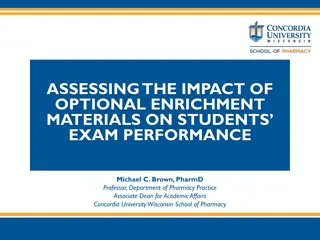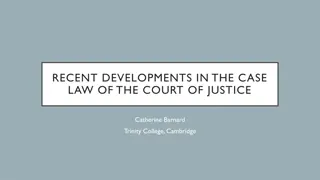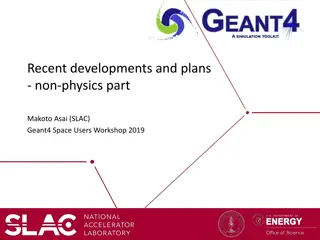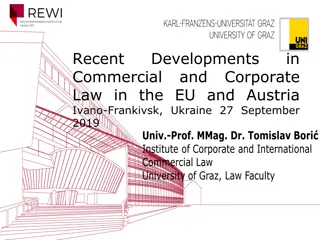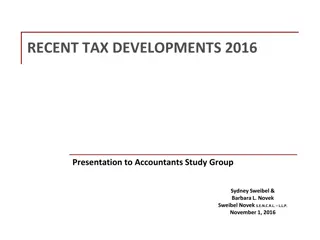Recent Developments in English Law of Tracing & Unjust Enrichment
Recent decisions in English law show a shift in tracing & unjust enrichment practices. Cases like Brazil v. Durant and Bank of Cyprus v. Menelaou indicate a move towards a looser causal connection requirement. The discussion on backwards tracing and unjust enrichment has evolved from the Court of Appeal, with a trend away from a strict proprietary approach.
Download Presentation

Please find below an Image/Link to download the presentation.
The content on the website is provided AS IS for your information and personal use only. It may not be sold, licensed, or shared on other websites without obtaining consent from the author. Download presentation by click this link. If you encounter any issues during the download, it is possible that the publisher has removed the file from their server.
E N D
Presentation Transcript
Recent Developments in the English Law of Tracing and Unjust Enrichment Christopher Bond 3 Verulam Buildings COMBAR North American Meeting, Venice 31 March 2016
Overview Two recent decisions suggesting a change of approach at highest appellate level: Brazil v Durant Privy Council decision on backwards tracing Bank of Cyprus v Menelaou - Supreme Court decision on requirements for unjust enrichment Builds on earlier discussion of both points in Court of Appeal Relfo v Varsani General trend towards a looser, causal connection as requirement for tracing/unjust enrichment away from stricter, proprietary approach
Backwards tracing Bishopsgate Investment Management Ltd v Homan [1995] Ch 211 claim by trustee of Maxwell pension fund seeking to trace misappropriated sums through overdrawn accounts Vinelott J: agreed that tracing was not possible through overdrawn account but held open the possibility that tracing was possible where an asset was acquired using borrowed money, where there was an intention that the borrowing should be repaid using the misappropriated funds backwards tracing Court of Appeal split: o Dillon LJ open to possibility of backwards tracing o Leggatt LJ hostile o Henry LJ laconically agreed with both
Relfo v Varsani - facts Relfo Ltd (in liquidation) v Varsani [2014] EWCA Civ 360; [2015] 1 BCLC 14 Relfo on the verge of insolvency when director wrongfully paid 500,000 from its bank account to the account of Mirren, in Latvia That same day, the USD equivalent of 500,000 was paid from the bank account of another company, Intertrade, in Lithuania, to the account of Mr Varsani in Singapore, whose family were business associates of the dishonest director Common ground that the Intertrade payment preceded the Mirren payment, and that there was no evidence to show the chain of substitutions of value (if any) between the Mirren payment and the Intertrade payment
Relfo first instance Liquidator (HMRC) sued Mr Varsani for knowing receipt and sought to trace from the Mirren payment to the Intertrade payment Alternative claim that Mr Varsani had been unjustly enriched at Relfo s expense more on the restitution claim later Sales J allowed the claim ([2012] EWHC 2168 (Ch)) Mirren payment and Intertrade payment were sufficiently close in time and amount that in the absence of any credible explanation the Court could infer that the director s intention, in making the Mirren payment, was to cause the Intertrade payment No need to identify every step in the process or for strict chronological sequence
Relfo Court of Appeal (1) Arden LJ: o permissible for the judge to infer that the Mirren payment and the Intertrade payment were causally and transactionally linked so as to allow tracing ([56]-[59]) o strict chronology did not matter where the judge was entitled to find that the earlier, Intertrade payment was made on the faith that Intertrade would subsequently be reimbursed by Mirren using funds from the later, Mirren payment ([60]-[63]) o endorsement of backwards tracing and establishment of indirect, causal test for connection transfers of value, rather than needing to demonstrate unbroken chain of direct substitutions of one item of property for another o Gloster and Floyd LJJ simply agreed on tracing issue but had more to say on unjust enrichment
Relfo Court of Appeal (2) Extension of existing authority (Millett J): o El Ajou v Dollar Land Holdings plc [1993] 3 All ER 717 involved considerably more straightforward inferences o Agip (Africa) Ltd v Jackson [1990] Ch 265 involved no express consideration of timing issue Approach endorsed by Supreme Court in Menelaou and followed in High Court: Orb ARL v Ruhan [2015] EWHC 262 (Comm) (Cooke J)
Brazil v Durant - facts Federal Republic of Brazil v Durant International Corporation [2015] UKPC 35 Appeal to Privy Council from Court of Appeal of Jersey Effective claimant Municipality of Sao Paolo and defendant companies under control of former mayor Companies liable as constructive trustees in respect of bribes received by mayor Municipality sought to trace payments into Channai account and thence into Durant account and thence into Kildare account Companies defended part of claim on bases that some of the payments out of the Channai account preceded payments of bribes into that account Relied on rule against backwards tracing and on lowest intermediate balance rule
Brazil v Durant Privy Council (1) Conceptually the Appellants argument is coherent and it is supported by a good deal of authority ([18]) Identified essential tension between ([25]-[26]): o need to be able to identify the money at every stage of the process Morritt LJ (obiter) in Foskett v McKeown (CA) o focus away from idea of physical possession of asset or of money and towards identifying the causal and transaction links between the transfers of value inherent in that asset Lord Millett in Foskett (HL) Rejected as a statement of general application Respondents very broad proposition that money used to pay a debt can in principle be traced into whatever was acquired in return for the debt risk of prejudice to unsecured creditors ([33])
Brazil v Durant Privy Council (2) But backwards tracing permissible where a close causal and transactional link between the incurring of a debt and the use of trust funds to discharge it ([34]) cautions against approach to divide minutely the connected steps by which, on any sensible commercial view the substitution of one asset for another had taken place and instead to look at the transaction overall ([37])
Brazil v Durant Privy Council (3) Policy reason: The development of increasingly sophisticated and elaborate methods of money laundering, often involving a web of credits and debits between intermediaries, makes it particularly important that a court should not allow a camouflage of interconnected transactions to obscure its vision of their true overall purpose and effect. If the court is satisfied that the various steps are part of a coordinated scheme, it should ([38]) Conclusion: The Board therefore rejects the argument that there can never be backward tracing, or that the court can never trace the value of an asset whose proceeds are paid into an overdrawn account. But the Claimant has to establish a coordination between the depletion of the trust fund and the acquisition of the asset which is the subject of the tracing claim, looking at the whole transaction ([40])
Relfo Unjust enrichment (1) Alternative claim in unjust enrichment even if Relfo failed on the tracing claim, could it say that Mr Varsani had been enriched at its expense Finding at first instance that Mr Varsani would not have received Intertrade payment but for the Mirren payment from Relfo Common ground that something more than a but for test required to say that the receipt (pace Goff & Jones) Concession that second requirement satisfied by counsel for Mr Varsani at trial; withdrawn and fully argued on appeal
Relfo Unjust enrichment (2) Relfo argued that the enrichment must come directly from the claimant, subject to limited exceptions such as agency or tracing Professor Burrows direct providers only rule; adopted by Henderson J in ITC v HMRC [2012] EWHC 458 (Ch); [2012] STC 1150 alternative view favours a looser, causal test: is there a sufficiently close link between the enrichment of D and C s loss to say there has been a transfer of value between them Floyd LJ in Menelaou v Bank of Cyprus [2013] EWCA Civ 1960; [2014] 1 WLR 854: economic reality
Relfo Unjust enrichment (3) Arden LJ: the law is moving towards identification of a general principle that the court should look to the broader underlying commercial or economic reality and the substance not the form to determine whether there is a sufficient link between the formation of the transaction whereby the claimant conferred a benefit on the direct recipient and the transaction under which the defendant obtained a benefit ([92]-[96]) Gloster LJ agreed (with some hesitation); Floyd LJ also favoured sufficiently close connection and economic reality tests over poles of but for and direct providers only ([115], [122]) compare close causal and transactional link requirement for tracing in Brazil v Durant
Menelaou - facts Mr and Mrs Menelaou owned Rush Green Hall, subject to two charges in favour of Bank of Cyprus Rush Green Hall was sold and 750,000 paid to the Bank to discharge Mr and Mrs Menelaou s borrowing, and 875,000 used to purchase Great Oak Court in name of Melissa Menelaou Bank released its charges over Rush Green Hall on understanding it would get a charge over Great Oak Court no valid charge as result of error by solicitors Bank argued that because 875,000 used to purchase Great Oak Court originated from its willingness to release its charges over Rush Green Hall, it should be subrogated to unpaid vendor s lien and so get a charge over Great Oak Court Issue was whether Melissa s enrichment was at the expense of the Bank?
Menelaou Supreme Court Unanimous dismissal of Melissa s appeal Lords Clarke and Neuberger give concurring judgments; Lords Kerr and Wilson agree need to look at transactions as part of overall scheme and determine whether there was a sufficient causal connection nexus or link [(27)] rejection of any direct providers only rule and Melissa s argument dismissed as pure formalism ([99]) Lord Carnwath preferred more traditional, proprietary route requiring a tracing link and rejected economic reality test of Court of Appeal in Menelaou and Relfo ([107]) cf. Moses LJ who also rejected somewhat fuzzy concept
Conclusions General trend towards a looser, causal connection as requirement for tracing/unjust enrichment away from stricter, proprietary approach Unclear from Brazil v Durant whether close causal and transactional link entails more than a simple but-for test for tracing, although Relfo suggests this is insufficient for unjust enrichment Unfortunate reluctance of appellate courts to lay down any clear guidelines for liability where transfer is indirect: ITC v HMRC [2015] EWCA Civ 82; [2015] STC 1280 at [65] Development will give courts greater flexibility in dealing with fraud/money laundering claims strong policy arguments in favour Conversely likely to cause uncertainty as courts will look to co-ordination , intention and economic reality relatively fuzzy concepts when compared with narrower, traditional approach
Christopher Bond 3 Verulam Buildings 3vb.com cbond@3vb.com (+44) 0207 831 8441
